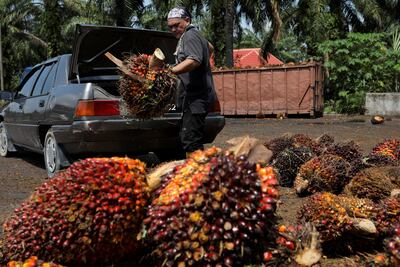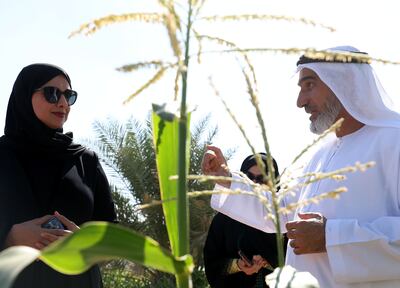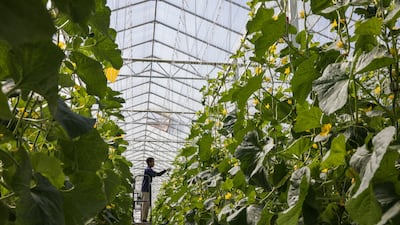As we embark on Cop29 in Baku, it is a time for reflection, but more importantly, a time for action, building on the exceptional platform created by Cop28 in the UAE.
The global food system, despite producing enough to feed everyone, is failing millions. The universal truth is that a hungry child cannot learn, a hungry adult cannot work, and a hungry society cannot thrive. Food insecurity is a silent thief, stealing potential and robbing futures. Empty stomachs breed empty dreams.
Food insecurity is a barrier to progress, trapping individuals and communities in a cycle of poverty and despair. And while progress has been made in certain regions, the number of people facing hunger remains stubbornly high, and the world is off track to meet the Sustainable Development Goal of Zero Hunger by 2030. This stark reality demands a fundamental shift in our approach to food security. We must move beyond the simplistic notion that increasing yields alone will solve the problem.
The challenges we face are complex and interconnected. Climate change, with its increasing frequency of extreme weather events, is disrupting agricultural production and threatening livelihoods. Conflicts and economic downturns further exacerbate food insecurity, pushing vulnerable populations into a vicious cycle of poverty and hunger. A world where millions go hungry is a world out of balance.
Simply producing more food within this volatile context is not enough. We need to build food systems that are resilient, sustainable and equitable, ensuring that everyone has access to safe, nutritious and affordable food, regardless of where they live.

This requires a paradigm shift, moving away from a narrow focus on production towards a holistic approach that encompasses the entire food system, from farm to fork.
We need to invest in climate-smart agriculture, promoting practices that conserve resources, adapt to changing conditions and mitigate greenhouse gas emissions. We must strengthen local food systems, empowering smallholder farmers, particularly women, who play a vital role in food production and rural economies.
Reducing food loss and waste throughout the supply chain is equally crucial. Currently, one-third of all food produced is lost or wasted, representing a colossal waste of resources and a missed opportunity to feed millions. Investing in better storage, transport and processing infrastructure, as well as promoting responsible consumption patterns, can significantly reduce this waste and enhance food security.
Further, we need to prioritise the production and consumption of nutritious foods. While global food production has increased, the affordability of healthy diets remains a challenge for billions. Unhealthy food environments, characterised by the abundance of processed foods high in fats, sugars and salt, are contributing to a global rise in obesity and diet-related diseases.
We must create food environments that encourage the consumption of fruits, vegetables, legumes and other nutrient-rich foods, making healthy diets accessible and affordable for all.
But let me be clear: the fight against hunger is not a spectator sport. We all have a role to play, from supporting sustainable agriculture to reducing food waste in our own homes.
In fact, the UAE, guided by its commitment to sustainable development, is actively pursuing a holistic approach to food security. We are investing in cutting-edge agricultural technologies, promoting sustainable farming practices, working with our farmers and fisherfolk at a hyper-local level to support them, and strengthening international partnerships such as “Aim for Climate” to address global food challenges.

We are also working to enhance food trade and logistics, ensuring the efficient flow of food from surplus to deficit regions. Recently we launched our “Plant the Emirates” National Programme, aimed at bringing together business, communities and individuals to find new ways to address our biggest agricultural challenges, boost domestic production, upskill farmers and finance agricultural projects through a new National Agricultural Centre.
With Cop29 around the corner, let us recognise that food security is not just about producing more, but about producing better, distributing more equitably and consuming more responsibly. It is about building resilient food systems that can withstand shocks, nourish populations and contribute to a sustainable future for all.
How we achieve that is by acting in unison, because the truth is that the challenges of food insecurity are too great for any one nation or organisation to solve alone. We need to forge partnerships, share knowledge and work together to create lasting solutions. It requires a world where every nation contributes its strengths, every organisation lends its expertise, and every individual plays their part. That’s the power of collective action, and that’s how we will conquer hunger.
The UAE stands ready to collaborate with partners around the world to achieve this shared vision, and I know that each of the 160 nations that have now signed the UAE Cop28 Declaration on Resilient Food Systems, Sustainable Agriculture and Climate Action are equally committed to creating a global food system that feeds, rather than fails.


